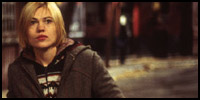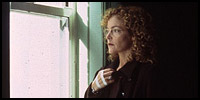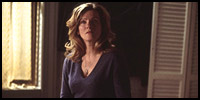
 |
|
Thirteen Conversations About One Thing (2002)  Directed by Jill Sprecher Cast: Alan Arkin, Matthew McConaughey, Clea DuVall, John Turturro, Tia Texada, Amy Irving, William Wise, Frankie Faison, Rob McElhenney, Shawn Elliott, Barbara Sukowa, Alex Burns, David Connelly 2002 – 102 minutes Rated: Reviewed by Dustin Putman, July 3, 2002.  The many characters in "Thirteen Conversations About One Thing" strive every second of their waking lives to be happy. After all, isn't that the major goal that we are constantly striving to reach? Like life, it doesn't always turn out that way. Those that deserve contentment don't always find it, and those that don't, do. Through the power of their own actions and the unavoidable hands of fate, each character finds their personal outlook shattered or mended by the time the end credits roll. And life goes on.
The many characters in "Thirteen Conversations About One Thing" strive every second of their waking lives to be happy. After all, isn't that the major goal that we are constantly striving to reach? Like life, it doesn't always turn out that way. Those that deserve contentment don't always find it, and those that don't, do. Through the power of their own actions and the unavoidable hands of fate, each character finds their personal outlook shattered or mended by the time the end credits roll. And life goes on.
With "Thirteen Conversations About One Thing," director Jill Sprecher and screenwriting sister Karen Sprecher (whose 1997 workplace slice-of-life "Clockwatchers" was a small gem) have concocted one of the most emphatic and thought-provoking motion pictures of the year. Expertly weaving back and forth between four central storylines taking place in New York City over the span of a year, the film is told out of chronological order not as a gimmick, but as a means of deepening the relationships between these veritable strangers who may or may not realize the pivotal effect they have on each other's lives.  The picture begins as district attorney Troy (Matthew McConaughey), who proudly believes in the justice set by the judicial system, is celebrating his latest court win at a local bar. After one too many drinks, he sets off for home, only to hit someone in the road. In a moment of foolish haste and fear, he goes against everything he believes in and leaves the scene of the crime. With pangs of unbearable guilt, he begins to change the way he previously has lived his life and, as a reminder of his crime, keeps a head wound he sustained from the accident open with a razor blade.
The picture begins as district attorney Troy (Matthew McConaughey), who proudly believes in the justice set by the judicial system, is celebrating his latest court win at a local bar. After one too many drinks, he sets off for home, only to hit someone in the road. In a moment of foolish haste and fear, he goes against everything he believes in and leaves the scene of the crime. With pangs of unbearable guilt, he begins to change the way he previously has lived his life and, as a reminder of his crime, keeps a head wound he sustained from the accident open with a razor blade.
Walker (John Turturro) is a college professor in such desperation to find happiness in any way possible that he has begun an affair with a colleague (Barbara Sukowa) behind his wife's (Amy Irving) back. What he fails to realize before it's too late is that his wife, Patricia, has known about it for quite some time, and is biding her time before the inevitable breakup of their marriage.  Meanwhile, Beatrice (Clea DuVall) is a humble housekeeper so completely blissful with her place in life that her more cynical friend and coworker, Dorrie (Tia Texada), looks up to her with admiration and hope for the future. Even after Beatrice is hit by a car and narrowly escapes death, she views the occurrence as a sign that she was meant to remain on the Earth for some reason. Beatrice's outlook drastically changes and her indomitable spirit plummets, however, when she finds herself being falsely accused by a client of theft.
Meanwhile, Beatrice (Clea DuVall) is a humble housekeeper so completely blissful with her place in life that her more cynical friend and coworker, Dorrie (Tia Texada), looks up to her with admiration and hope for the future. Even after Beatrice is hit by a car and narrowly escapes death, she views the occurrence as a sign that she was meant to remain on the Earth for some reason. Beatrice's outlook drastically changes and her indomitable spirit plummets, however, when she finds herself being falsely accused by a client of theft.
Finally, Gene (Alan Arkin) is a mid-level manager at an insurance company so disgruntled with his life that, when asked to downsize the company to save money, decides to lay off his most joyful and uplifting worker (William Wise) in an attempt to emotionally ruin him. What Gene doesn't realize is that, for all of the problems he is having (he is separated from his wife and has a drug-addicted son), they are about to get much worse.  A film that pulses with empathy toward its imperfect characters, "Thirteen Conversations About One Thing" captures the resourcefulness and fragility of human nature with a consistently sharp eye that proves truly mesmerizing. A true conversation-starter, the movie leaves such an impact by its conclusion that to walk out and not be thinking of one's own choices, and the eventual repercussions they caused, is to completely have missed the point of what Jill and Karen Sprecher want us to take away from it all.
A film that pulses with empathy toward its imperfect characters, "Thirteen Conversations About One Thing" captures the resourcefulness and fragility of human nature with a consistently sharp eye that proves truly mesmerizing. A true conversation-starter, the movie leaves such an impact by its conclusion that to walk out and not be thinking of one's own choices, and the eventual repercussions they caused, is to completely have missed the point of what Jill and Karen Sprecher want us to take away from it all.
One of the many aspects of the film the Sprecher sisters have accomplished with exquisite accuracy is in introducing an ensemble of people, both in large and minor roles, who all have lives outside of the scenes they are captured in. In the course of the film, each is forced to make a number of decisions that may forever alter their own, and other people's, futures. The human beings filling each frame do not seem like characters as much as real-life people gradually imploding as they realize what little control they have in the outcomes of their every move.  The performances are superlative across the board. Alan Arkin (2001's "America's Sweethearts"), as the almost cluelessly vengeful Gene, has what is arguably the most developed and subtly challenging role, and his stupendous work is Oscar-worthy. The same could be said for Clea DuVall (1999's "Girl, Interrupted"), as Beatrice, whose drastic change from a wide-eyed optimist to a broken-down pessimist is genuinely heartbreaking. Matthew McConaughey (2002's "Frailty") hits every key with perfection as his character of Troy travels on a downward spiral to feelings of true reprehensibility. Rounding out the central four players, John Turturro (2002's "Mr. Deeds") displays effective doses of self-involvement and loneliness as the comfortable life he once had drifts off into the distance.
The performances are superlative across the board. Alan Arkin (2001's "America's Sweethearts"), as the almost cluelessly vengeful Gene, has what is arguably the most developed and subtly challenging role, and his stupendous work is Oscar-worthy. The same could be said for Clea DuVall (1999's "Girl, Interrupted"), as Beatrice, whose drastic change from a wide-eyed optimist to a broken-down pessimist is genuinely heartbreaking. Matthew McConaughey (2002's "Frailty") hits every key with perfection as his character of Troy travels on a downward spiral to feelings of true reprehensibility. Rounding out the central four players, John Turturro (2002's "Mr. Deeds") displays effective doses of self-involvement and loneliness as the comfortable life he once had drifts off into the distance.
The ultra-fine acting turns do not stop there. Amy Irving (2000's "Traffic"), in the strongest part she has had in years, finds strength in her character of Patricia, who discovers her husband's infidelity and is surprised to find how easily she accepts it. As a troubled student in Walker's class who looks for hopeful guidance in his teacher and only finds brutal anthropy, Rob McElhenney's (2000's "Wonder Boys") pivotal bearing on Walker's section of the film is downright haunting. Tia Texada (2000's "Nurse Betty") also creates an unforgettable character in Dorrie, who loses faith in anything good happening in her life when Beatrice alarmingly changes her own attitude.  "Thirteen Conversations About One Thing" is a startling rumination on life that avoids pretentiousness by playing out its hand with an unflinching reality to the people it is about. So involving, and so unshakably honest, are its themes and ideas that it is a shame it doesn't run another half-hour, which could have fleshed out the characters even more. The final scene, which involves two strangers—both people we have become deeply attached to through the course of the film—finding personal solace in a moment of mutual recognition, is brilliant. "Thirteen Conversations About One Things" is, at once, reassuring and disheartening, remarkably powerful and earnestly genuine. We, as human beings, are all in the same boat, director Jill Sprecher so passionately wants us to know, and the only way to truly find happiness is to press on with life in the best way we know how, thankful that those around us are just as flawed as we.
"Thirteen Conversations About One Thing" is a startling rumination on life that avoids pretentiousness by playing out its hand with an unflinching reality to the people it is about. So involving, and so unshakably honest, are its themes and ideas that it is a shame it doesn't run another half-hour, which could have fleshed out the characters even more. The final scene, which involves two strangers—both people we have become deeply attached to through the course of the film—finding personal solace in a moment of mutual recognition, is brilliant. "Thirteen Conversations About One Things" is, at once, reassuring and disheartening, remarkably powerful and earnestly genuine. We, as human beings, are all in the same boat, director Jill Sprecher so passionately wants us to know, and the only way to truly find happiness is to press on with life in the best way we know how, thankful that those around us are just as flawed as we.
©2002 by Dustin Putman |
 |













